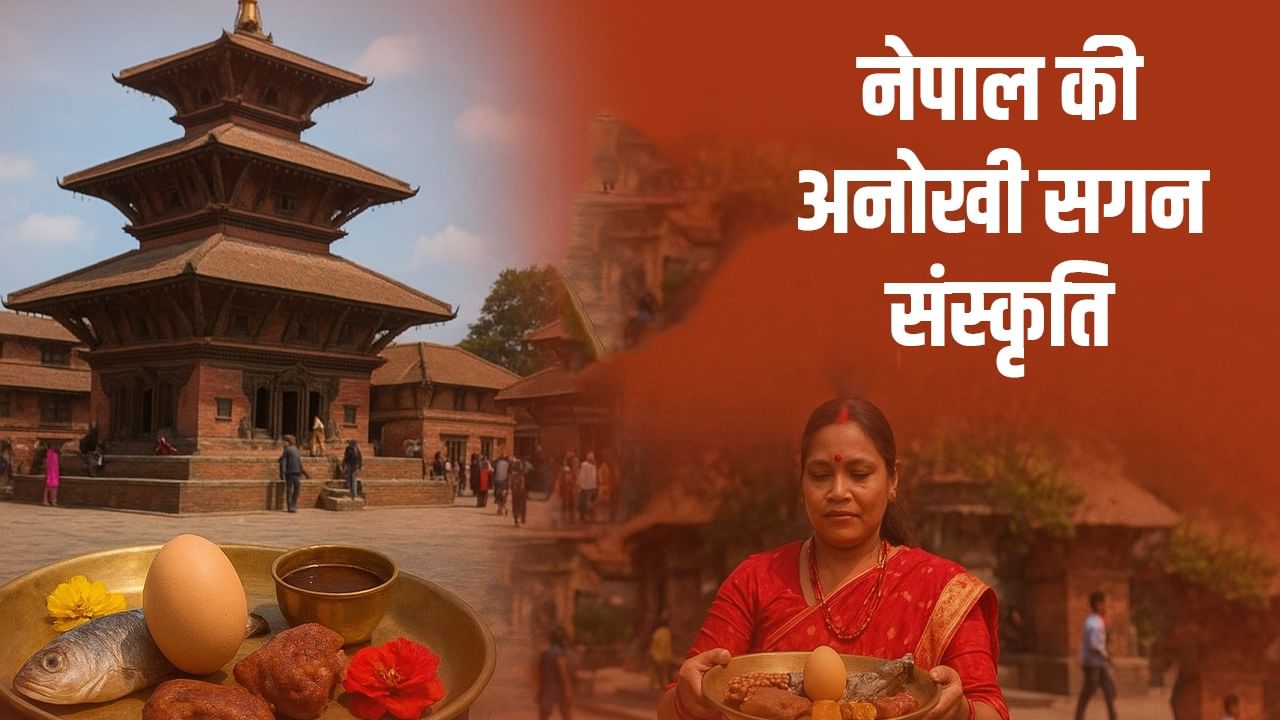Nepal’s Sagan Culture: Where eggs, fish and alcohol are also considered auspicious signs!
Nepal’s Sagan Culture: In the world of religion and culture, India and Nepal are often threaded in the same thread. Worshiping, chanting, fasting, fasting and beliefs of Gods and Goddesses seem to be similar in both countries, but when it comes to Sagan tradition, the culture of Nepal appears to be completely opposite from India. While in the name of Sagun in India, fruits, sweets, coconut or worship items are given, it is added to fish, egg and alcohol in Nepal. Not only this, in many temples, these offerings are offered at the feet of deities.
What is Sagan culture?
In the Newar community of Nepal, Sagan is mandatory on every religious and social occasion, marriage, marriage, fasting, festival and even death rites. In this, the devotee is given five special items to get the blessings of the deities and to bring auspiciousness in life.
Egg – Symbol of life and energy
Symbol
Curd – symbol of purity and peace
Meat
Alcohol (alcohol) -Symbol
Apart from these, fruits, flowers and sweets are also included according to local traditions.
Special importance of eggs
Egg is considered to be the most important in Sagan culture. It is considered a symbol of the origin and continuity of life. This is the reason why devotees wish to fulfill their wishes by offering eggs in many temples of Nepal, especially in Manokamana Devi Temple.
How did meat and alcohol become auspicious?
Meat and alcohol are considered taboo in Hindu beliefs, but in Nepal’s Sagan culture, they are considered elements who please the deities. Actually, in Nevar culture, they have been considered a symbol of life and enthusiasm of life. It is believed that the deities accept them happily and in return provide strength, courage and success to the devotees.
Sagan on every occasion
Birth – At the time of the birth of a child, the family is wished by giving them sorrow.
Marriage-The bride and groom are blessed with the happiness and prosperity of married life by giving them sagans.
Festivals – Sagan is distributed in every family in festivals like Dashain and Tihar.
Shraddha – Even in the death rite, Sagan is given so that Pitra is peaceful.
Even today live tradition
Even in the 21st century, when traditions are slowly changing, Nepal’s Sagan culture is equally relevant and lively today. This tradition is deeply involved in the temples of Kathmandu Valley and the festivals of Newar society.
What does Sagan mean?
In Nepal, Sagan is not just with best wishes or blessings, but it is a special tantric and cultural ritual whenever there is a big work, new business, examination, child receiving or any important opportunity is played in the house, then the family and relatives are symbolic of eggs, fish and alcohol to the family. It is believed that it is a call for power and removes the difficulties of life.
This tradition reached temples
This tradition of Nepal is not limited to home and family, but it has also reached temples. In many Shakti Peethas and temples, devotees offer eggs and liquor to the deities. It is considered a means of pleasing the Goddess and getting quick blessings.
Manokamna Temple- Egg and Bali for wish
The famous Manokamna temple of Gorkha district is such a Shakti Peeth of Nepal where there is a recognition of fulfilling every wish of devotees. The tradition of sacrificing here has been since ancient times, but many devotees express their faith by offering eggs instead of sacrifice. The priests here also accept this because it is believed that the mother and wish is happy and fulfills the wish immediately.
Kamalamai Temple- Where women offer eggs and alcohol
The Kamalamai temple in Indhuli district of Nepal is a lively example of Sagan culture. Here not only sacrifice, but eggs and alcohol are also offered to the goddess. The special thing is that women offer it here with special faith. Women offer eggs and liquor to the goddess to get married problems, children and to overcome crisis. There is a local belief that Maa Bhagwati immediately pleases and fulfills wishes.
Special tradition in Dasain and other festivals
The biggest festival of Nepal is Dasain (Durga Puja). During this time, offering sacrifices, eggs and liquor in temples and houses across the country has special significance. It is believed that offering all this to Durga, the goddess of power, protects the family and brings prosperity. This is the reason that queues of eggs and goats are seen outside the temples in Nepal at the time of Dasain.
Why is Nepal’s tradition reversed from India?
In India, worship recitation is associated with sattvic diet. There is a tradition of offering fruits, sweets, milk, coconut and panchamrit in temples as offerings. At the same time, the Sagan culture of Nepal takes it in the reverse direction. There it is considered a sacrifice and power offering to awaken the power of the Goddess. Local belief that meat, fish, eggs and alcohol symbolize the energy and strength of life. This is the reason that the people of Nepal consider it auspicious and offer it to the goddess and ask for blessings.
Mystery or faith?
Even today, this tradition is as prevalent in Nepal as it was centuries ago. Some people call it a tantric tradition, while some connect it to the depth of faith, but there is no doubt that this culture is completely different and unique from India. This is the reason that people coming to the temples and religious events of Nepal are surprised to see this tradition.
Disclaimer: The information given in this news is based on religious beliefs. TV 9 India does not confirm this.
